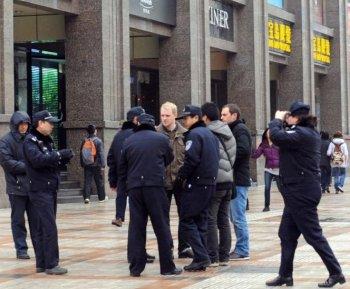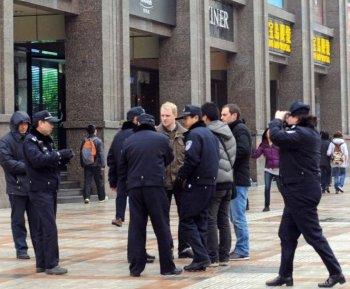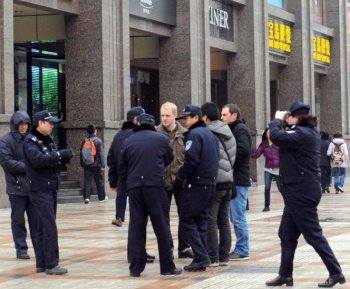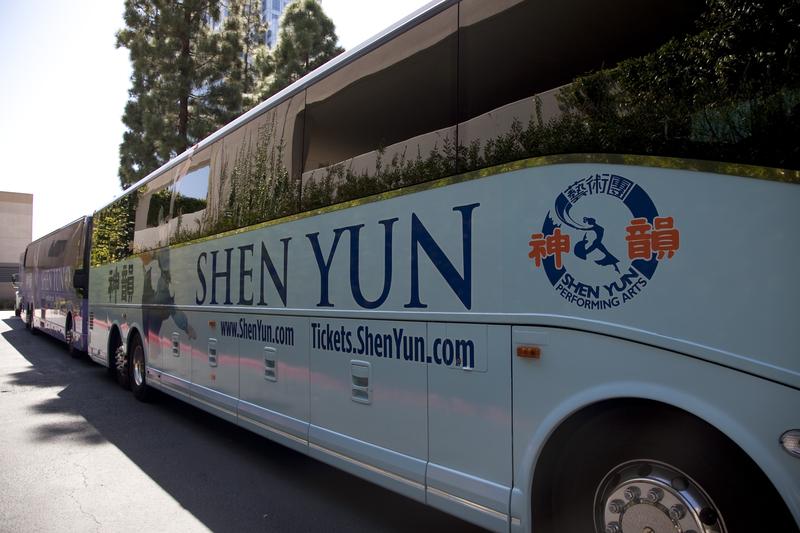The ever-growing storm of demonstrations against authoritarian rulers in the Middle East and North Africa has made the Chinese regime extremely jittery. Recently, foreign journalists were assaulted and detained. Prominent Chinese human rights lawyers and activists have also been arrested or harassed by Chinese police.
Hundreds of uniformed and plainclothes policemen in Beijing and Shanghai patrolled likely protest sites on Feb. 27, the second Sunday of high alert, following calls on the Internet for China’s own “Jasmine Protests.”
Foreign journalists were followed, and those with cameras were blocked from entering the Wangfujing area--Beijing’s main shopping street--located a short walk from the heavily policed Tiananmen Square.
Witnesses said an American news videographer was kicked, repeatedly hit in the face with brooms, and taken into police custody, Radio Free Asia (RFA) reported on Feb. 27.
Chinese police also detained journalists from Germany’s two public broadcasting networks, who were trying to film antigovernment protests along Wangfujing, Deutsche Welle said on Feb. 27.
The German journalists were later released. Some complained of heavy-handed police treatment, the report said.
Chinese police shoved and pushed a BBC cameraman at the entrance to Wangfujing, Damian Grammaticas, a BBC reporter at the scene reported on Feb. 27. Grammaticas said he too was manhandled: “My hair was grabbed and pulled by one of the state security goons ... They tried to pick me up and throw me bodily into the van.”
Two Taiwanese reporters with a local TV station were briefly taken away by police from Wangfujing Street on the same day. One of them was injured when police took him away by force, Taiwan’s Central News Agency reported .
Foreign journalists in China have previously been allowed greater reporting freedoms than their Chinese colleagues, but those days may be over.
An earlier report by RFA said the Exit-Entry Administration Office of Beijing Municipal Public Security Bureau and Beijing Foreign Affairs Office had called foreign news bureaus in Beijing, instructing them to summon their reporters for an urgent meeting on Feb. 25. A foreign reporter told RFA that they were advised to “follow the rules” in reporting major events.
Beijing Daily also published an article on Feb. 25 regarding new interview rules in Beijing. It said, “Beijing authorities reiterate that reporters must follow laws and rules while reporting in Beijing, namely, submitting applications, obtaining permission from the interviewed entities or individuals, showing valid ID, and following related administrative rules.”
Canada’s Globe and Mail reporter Mark MacKinnon said on Twitter : “I declined late night tea invitation, was reminded to ‘obey the laws of China’ whilst reporting. Perhaps tied to Jasmine gathering Sunday?”
Jon Huntsman, U.S. ambassador to Beijing and presidential hopeful, whose “coincidental” presence was observed at the Jasmine rally in Beijing’s Wangfujing shopping area on Feb. 20, consequently had his name blocked by Chinese search engine Sina, RFA reported on Feb. 25.
Hundreds of uniformed and plainclothes policemen in Beijing and Shanghai patrolled likely protest sites on Feb. 27, the second Sunday of high alert, following calls on the Internet for China’s own “Jasmine Protests.”
Foreign journalists were followed, and those with cameras were blocked from entering the Wangfujing area--Beijing’s main shopping street--located a short walk from the heavily policed Tiananmen Square.
Witnesses said an American news videographer was kicked, repeatedly hit in the face with brooms, and taken into police custody, Radio Free Asia (RFA) reported on Feb. 27.
Chinese police also detained journalists from Germany’s two public broadcasting networks, who were trying to film antigovernment protests along Wangfujing, Deutsche Welle said on Feb. 27.
The German journalists were later released. Some complained of heavy-handed police treatment, the report said.
Chinese police shoved and pushed a BBC cameraman at the entrance to Wangfujing, Damian Grammaticas, a BBC reporter at the scene reported on Feb. 27. Grammaticas said he too was manhandled: “My hair was grabbed and pulled by one of the state security goons ... They tried to pick me up and throw me bodily into the van.”
Two Taiwanese reporters with a local TV station were briefly taken away by police from Wangfujing Street on the same day. One of them was injured when police took him away by force, Taiwan’s Central News Agency reported .
Rules for Foreign Journalists
Foreign journalists in China have previously been allowed greater reporting freedoms than their Chinese colleagues, but those days may be over.
An earlier report by RFA said the Exit-Entry Administration Office of Beijing Municipal Public Security Bureau and Beijing Foreign Affairs Office had called foreign news bureaus in Beijing, instructing them to summon their reporters for an urgent meeting on Feb. 25. A foreign reporter told RFA that they were advised to “follow the rules” in reporting major events.
Beijing Daily also published an article on Feb. 25 regarding new interview rules in Beijing. It said, “Beijing authorities reiterate that reporters must follow laws and rules while reporting in Beijing, namely, submitting applications, obtaining permission from the interviewed entities or individuals, showing valid ID, and following related administrative rules.”
Canada’s Globe and Mail reporter Mark MacKinnon said on Twitter : “I declined late night tea invitation, was reminded to ‘obey the laws of China’ whilst reporting. Perhaps tied to Jasmine gathering Sunday?”
Jon Huntsman, U.S. ambassador to Beijing and presidential hopeful, whose “coincidental” presence was observed at the Jasmine rally in Beijing’s Wangfujing shopping area on Feb. 20, consequently had his name blocked by Chinese search engine Sina, RFA reported on Feb. 25.




